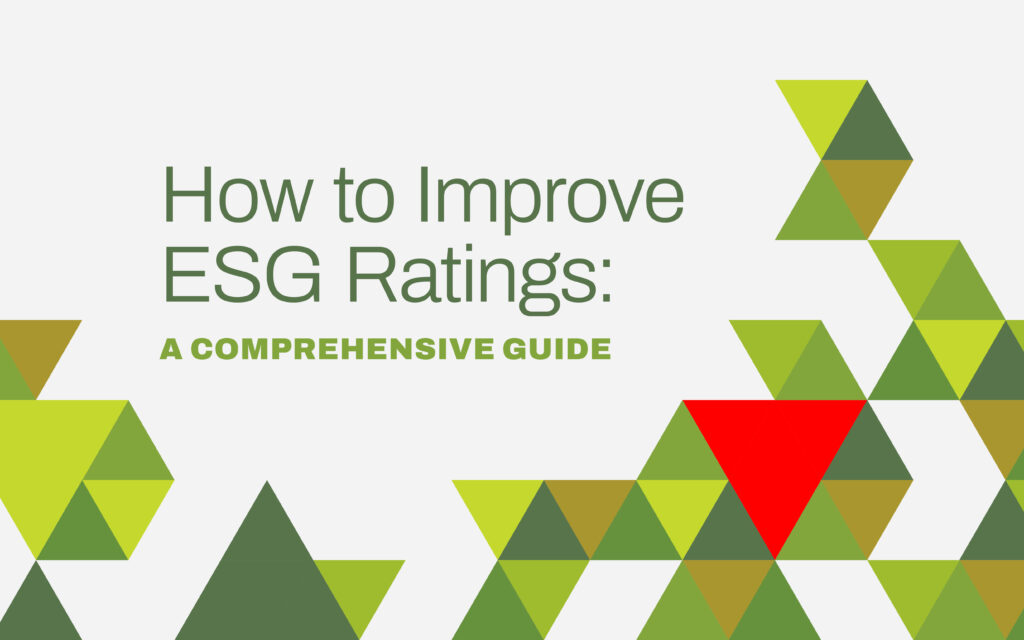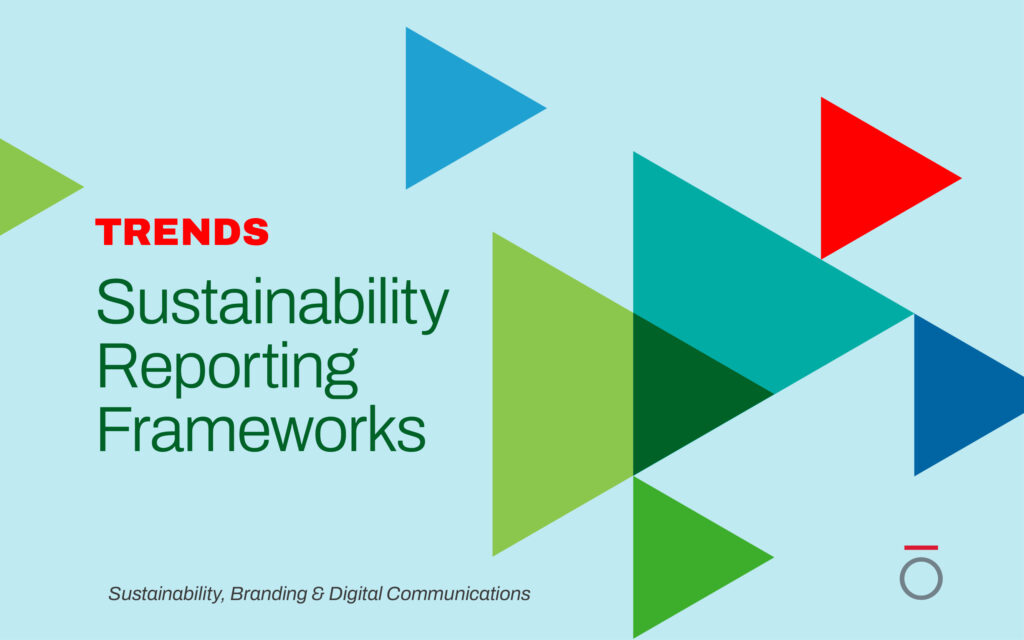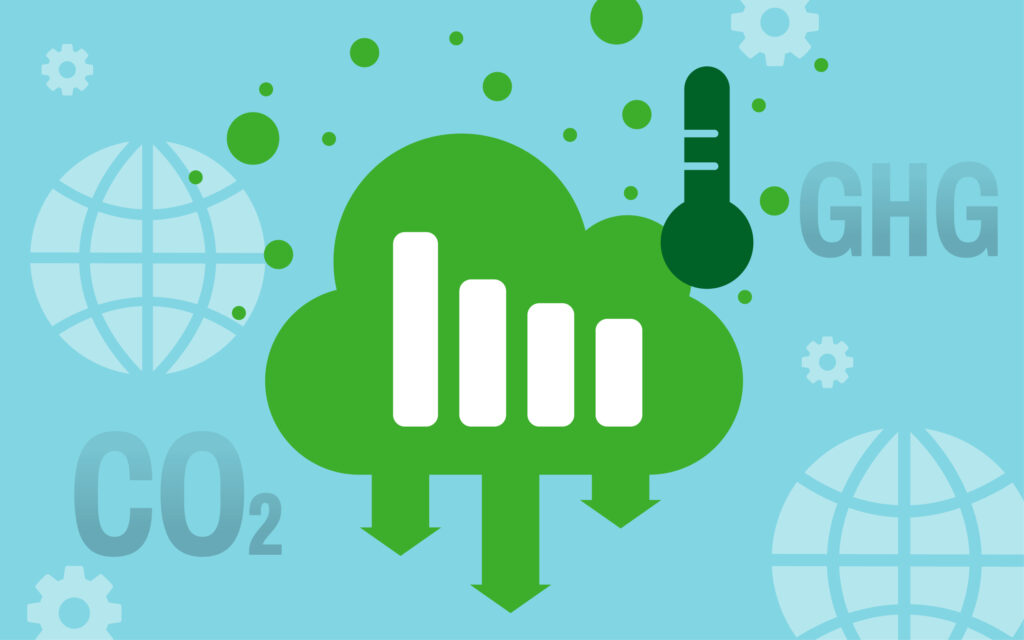How to Improve ESG Ratings: A Comprehensive Guide
Sustainability & ESG, Guides / June 18, 2024
By Mary Riddle

Improving your ESG ratings can enhance your reputation, attract investment, and ensure long-term success. However, every ratings agency utilizes different methodologies, criteria, and schedules.
How can you ensure your company is getting the credit it deserves from ratings agencies?
Here, we take a deep dive into the agencies, methodologies, and best practices that make up the ESG ratings universe.
Who are the ESG Rating Agencies?
Before diving into ways to improve ESG scores, it is important to understand who is evaluating your program. There is an ever-increasing multitude of ESG raters and rankers in the world, but the following are the top six:
Sustainalytics
Sustainalytics, originally launched in 1992, evaluates the sustainability of publicly traded companies based on their ESG performance. Sustainalytics was the first ratings agency to evaluate firms on environmental, social, and governance performance and currently rates over 20,000 organizations on a numerical rating scale from zero to 50 corresponding to perceived ESG risk level. Sustainalytics also rates companies against their overall sector.
ISS
ISS has been advising organizations on governance matters since 1997. In 2020, ISS launched their ESG ratings platform, initially aimed to evaluate the ESG performance of investment funds. Today, ISS ESG ratings are also issued for corporations, countries, and green bonds. ISS currently rates over 11,500 organizations against their peers on an A+ to D- scale.
DJSI World Index
The DJSI World Index, first published in 1999, comprises the largest 2,500 companies from the Dow Jones Global Total Stock Market Index. It focuses on the top ten percent of these companies, approximately 300 in total, which are selected based on their performance in economic, environmental, and social criteria.
MSCI
MSCI ESG Ratings assess how well a company manages financially material ESG risks and opportunities. Launched in 1990 as a socially-responsible investing index, MSCI rates industry leaders and laggards based on their exposure to ESG risks and their efficacy in managing those risks compared to their peers. MSCI ESG Ratings range from leader (AAA, AA), to average (A, BBB, BB), to laggard (B, CCC). MSCI scores are batched by sector so that companies can be compared against their peers. MSCI currently rates over 8,500 companies globally.
CDP
The CDP is an international non-profit organization established in 2000 to support companies, cities, states, regions, and public authorities in disclosing their environmental impact. CDP conducts an annual scoring process that focuses on climate change, water, supply chain, and forests using a newly-integrated questionnaire. Companies receive a report-card style grade, ranging from A to D in each topic area. Recently, CDP has updated the process for small and medium enterprises to simplify reporting on climate progress and sustainability efforts for smaller companies. Additionally, they have included sections on biodiversity and plastic, although ratings for these areas are not yet provided. Companies that do not disclose their environmental data through CDP’s questionnaire receive an F grade. In 2022, nearly 18,700 organizations reported their environmental information through CDP.
Ecovadis
Ecovadis is one of the newest ratings agencies, but its novel structure has given it an outsized effect on corporations. Founded in 2007, Ecovadis rates over 90,000 organizations, many of which are private SMEs. Ecovadis gives companies an overall score, a percentile rating, and an industry ranking. Over 250 large brands, such as Nestle, Target, and others utilize Ecovadis to monitor their complex supply chains.
The large brands either request or require their suppliers to join Ecovadis. Each of those suppliers is rated on their environmental, labor and human rights, and ethics performance. While the large brands are rated on those metrics as an organization, they also receive a Sustainable Procurement Score, which is made up of the cumulative environmental, labor and human rights, and ethics scores of their suppliers. While Ecovadis scores are not available to the public, large brand partners can look up scores for participating suppliers in their supply chain. Many brands incentivize their suppliers to improve their ratings.
Understand Your ESG Score
To improve your ESG ratings, it’s crucial to understand the criteria and methodologies used by different rating agencies. Each agency has its own set of indicators and weightings. Familiarize yourself with these and ask yourself the following questions.
- Which ratings agencies are most important to your stakeholders?
- Are there metrics that can be easily incorporated into overall company strategy?
Ratings agencies generally only provide companies with a composite score, but subscores by category can often be requested. Ratings agencies employ relationship managers who can help companies understand their score and provide broad feedback. Ratings agencies will not release their scoring algorithms to companies, but the relationship managers will often give feedback on a category-by-category basis.
Ratings agencies are also performance-based with continuously-improving standards. If your company just treads water and does not make any meaningful progress in sustainability goals, your ratings will drop.
Best Practices for Improving ESG Performance and Scores
Build Internal Competencies
Generally speaking, reports that include information about ESG management policies and governance are correlated with higher ratings. If your company has not already done so, establish governance flows for the management of ESG issues and upskill your employees with sustainability training.
Sustainability reporting is only possible with the collaboration of your internal subject matter experts (SME) so it is important to create strong relationships with your company’s SMEs and keep them updated on what the ratings agencies are and why your company is responding to them. Consider providing sustainability training for your SMEs. When SMEs understand the value of their contributions, and when they receive credit for their work, they are more likely to respond more quickly, and with greater enthusiasm, to requests for data.
Set Clear and Measurable Goals
Ratings agencies want to see progress against goals. Set clear, measurable, and achievable ESG goals. These should be aligned with your overall business strategy and relevant to your industry.
Regularly monitor your ESG performance against set goals. Use key performance indicators (KPIs) to track progress and identify areas for improvement. Report your progress annually, highlighting achievements and addressing any gaps or challenges.
Enhance Transparency and Disclosure
Transparency is key to improving ESG ratings. Regularly disclose your ESG performance through sustainability reports, annual reports, and dedicated sections on your website.
Follow established reporting standards and frameworks such as the Global Reporting Initiative (GRI), Sustainability Accounting Standards Board (SASB), and Task Force on Climate-related Financial Disclosures (TCFD). Reporting to internationally-recognized standards and frameworks is correlated with higher ratings.
Improve Data Collection and Management
Accurate and comprehensive data collection is essential for credibility. Invest in systems and technologies that enable efficient data collection, management, and analysis. Data collection and storage systems should be kept updated so that your company is able to respond to information requests quickly and accurately. Additionally, data management systems help companies prevent roadblocks that can arise from employee turnover.
External verification or assurance of your ESG data also enhances trust. Engage third-party auditors to verify your ESG reports and ensure they meet the highest standards of accuracy and reliability. Raters generally give higher scores to companies that use third party assurance.
Consistently and Continuously Enhance Programs
All ratings agencies require companies to proactively improve their programs in order to maintain scores. Improving scores requires aggressively setting and meeting ESG goals and targets.
The best ESG scores are correlated with improving performance through the implementation of new initiatives and projects.
Organizational Tips
Different ratings agencies utilize different calendars and schedules for updating their ratings.
Consider creating a spreadsheet showing how each rater and ranker currently rates your company.
Include when you were last rated and information about when you expect your next rating or when an information portal may be opened.
If you’re not happy with your company’s score, consider creating a score gap analysis, mapping any available indicators to your internal programs. This can help you identify areas for improvement.
Moving Forward
Maintaining and improving ESG scores is a continuous process. Companies must be keenly attuned to their business drivers, understand standards and frameworks, know the relevant metrics for raters and rankers, all while implementing initiatives that drive long-term improvement.
How OBATA Can Help
For assistance on submitting or improving your sustainability or ESG scores, contact the experts at OBATA’s sustainability consulting services.
Our team can help you maximize your ratings submission efficiency and ensure you receive the credit you deserve for your company’s ESG efforts. Contact OBATA today.


